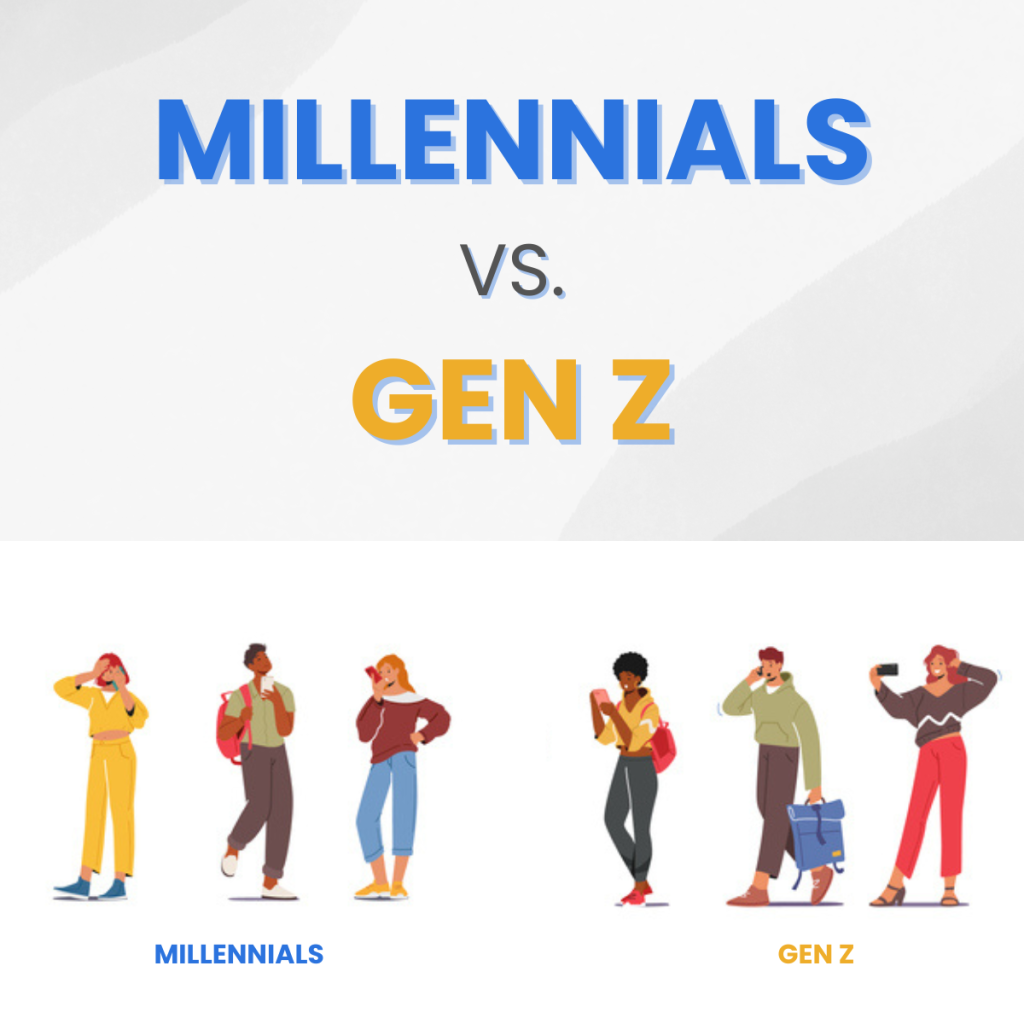
Successful marketing is rooted in really understanding your target audience. Two demographics that have been in the spotlight are Gen Z and Millennials. These generations share some similarities due to their digital upbringing but also exhibit distinct preferences and behaviors that necessitate different marketing strategies.
Millennials and Gen Z are two distinct generations, each characterized by its own set of birth years, experiences, and cultural influences. Here’s a brief overview of each generation:
Meet the Millennials

- Birth Years: 1981 – 1996 (age range as of 2023 is 27-42 years)
- Digital Pioneers: Millennials came of age during the rapid expansion of digital technology. They were the first generation to fully embrace the internet, social media, and mobile devices. This digital fluency has made them adept at navigating and utilizing technology in various aspects of their lives.
- Socially and Environmentally Conscious: Millennials are known for their strong commitment to social and environmental causes. They are more likely to support brands and companies that demonstrate a commitment to sustainability, social justice, and ethical business practices. This generation’s activism has played a role in pushing these issues to the forefront of public consciousness.
- Preference for Experiences Over Possessions: Millennials often prioritize experiences, such as travel, dining, and entertainment, over acquiring material possessions. This preference for experiences has influenced industries like travel and hospitality and has led to the rise of the “experience economy.”
Meet Gen Z

- Birth Years: Gen Z is the generation that follows Millennials. Born 1997 – 2012, their age range as of 2023 is 11 – 26 years.
- Tech-Native and Digital Natives: Gen Z is the first generation to grow up entirely in the digital age. They are characterized by their innate comfort and familiarity with technology, including smartphones, social media, and online communication tools. This tech-native status has shaped their communication styles and information consumption habits.
- Diversity and Inclusivity Advocates: Gen Z is known for its strong commitment to diversity, inclusivity, and social justice. They value representation and actively engage in discussions and activism related to racial, gender, and LGBTQ+ equality. Their advocacy has influenced corporate policies and marketing strategies.
- Pragmatic and Value-Conscious Consumers: Unlike previous generations, Gen Z tends to be more financially cautious and value-conscious. They often research products and services extensively before making purchasing decisions, seeking value and authenticity. They are also more likely to support brands that offer affordable and practical solutions.
Marketing to Millennials vs. Gen Z
Digital & Social Media Marketing
- Millennials: Heavily influenced by social media, prefer platforms like Facebook, Instagram, and Twitter. Strategies often include influencer partnerships, engaging content, and social media advertising.
- Gen Z: Prefers platforms like TikTok and Snapchat and values authentic, transparent content. Short, engaging, and visually appealing content tends to work best for this demographic.
- Both Generations:
According to Insider Intelligence, about half of US Gen Z (50%) and millennial (51%) social users make purchases on social media.

- When it comes to product and brand discovery and purchasing, 56% of Gen Z and 54% of Millennials (plus 48% of Gen X, and 26% of Boomers) say they discover new products most often on YouTube. (HubSpot Blog Research)
Content Marketing
- Millennials: Prefer content that is informative, entertaining, and valuable. They appreciate blogs, podcasts, and videos that help them learn and make informed decisions.
- Gen Z: Prefers bite-sized, visually appealing content, such as short videos and images. They have shorter attention spans and prefer content that is quickly and easily consumable.
Personalization
- Millennials: Expect brands to tailor their marketing messages and offers to their individual needs and preferences, often through email marketing and targeted ads.
- Gen Z: Also values personalization but expects a higher degree of it. They prefer brands that engage with them on a one-to-one basis and create personalized experiences.
Sustainability and Social Responsibility
- Millennials: Value brands that are environmentally responsible and ethically sound and are likely to support companies that share their values.
- Gen Z: Even more concerned about sustainability and social issues, they expect brands to take a stand on important issues and to be actively involved in making a positive impact.
Brand Loyalty
- Millennials: Seek convenience and value for money and are likely to stick to brands that meet these needs and share their values.
- Gen Z: Tends to be less brand loyal due to the abundance of choices available and places a higher emphasis on product quality and brand authenticity.
E-Commerce & Mobile Commerce
- Millennials: Comfortable with online shopping and use mobile devices for product research and purchases. Seamless mobile experiences and user-friendly platforms are crucial for this group.
- Gen Z: Prefers shopping via mobile applications and expects fast, seamless, and interactive shopping experiences. They value platforms that offer augmented reality and other advanced features.
Influencer Marketing
- Millennials: Influenced by celebrities and macro-influencers who have a large following.
- Gen Z: Prefers micro-influencers and peers who are more relatable and authentic.
Price Sensitivity
- Millennials: Tend to be price-sensitive and look for deals, discounts, and value for money.
- Gen Z: Also price-sensitive but values quality and is willing to pay a premium for products that meet their standards and preferences.
Conclusion
While Gen Z and Millennials share a digital upbringing, their marketing preferences and behaviors differ in meaningful ways. To effectively target these generations, brands must adapt their marketing strategies accordingly. By understanding these nuances and tailoring your marketing efforts, you can bridge the gap between these two influential demographics and create engaging campaigns that resonate with both.







